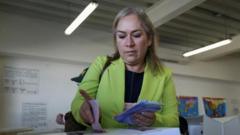The electoral victory raises questions around the judicial system's integrity in Mexico.
**Former Lawyer for El Chapo Wins Judicial Election in Mexico**

**Former Lawyer for El Chapo Wins Judicial Election in Mexico**
Silvia Delgado, who represented the notorious drug lord, is elected as a local judge amidst controversy.
Former defense attorney for Joaquín "El Chapo" Guzmán, Silvia Delgado, has made headlines after being elected as a local criminal judge in Ciudad Juárez, marking a historic first for Mexico's judicial elections. Official tallies revealed on Tuesday show Delgado securing enough votes to cement her position on the US-Mexico border, although her candidacy sparked significant controversy.
Critics, including a prominent transparency organization, accused Delgado of having ties to organized crime, allegations she staunchly refuted, insisting her role as El Chapo's counsel was purely professional. The 51-year-old lawyer was a member of Guzmán's defense team before the infamous leader of the Sinaloa cartel was extradited to the United States in 2017, where he was sentenced to life imprisonment for drug trafficking in 2019.
In an interview with BBC ahead of the elections, Delgado emphasized the right to legal representation, downplaying any potential conflicts of interest with her new judicial role. After the voting results were announced, she opted to withhold comments until her election victory was officially confirmed.
This electoral process, unprecedented in Mexico, was part of a significant reform pushed by the ruling Morena party. Proponents argue that directly electing judges, including those for the Supreme Court, fosters a more democratic judiciary that is accountable to the populace. However, detractors fear this move could compromise judicial independence.
Despite the reform’s implications, voter turnout was dismally low at just 13%, the lowest recorded for any federal election in Mexico. Many observers noted this lack of engagement as indicative of the public's apathy towards direct judicial elections. Nevertheless, President Claudia Sheinbaum hailed the electoral event as a significant achievement for the country's democratic efforts.
Critics, including a prominent transparency organization, accused Delgado of having ties to organized crime, allegations she staunchly refuted, insisting her role as El Chapo's counsel was purely professional. The 51-year-old lawyer was a member of Guzmán's defense team before the infamous leader of the Sinaloa cartel was extradited to the United States in 2017, where he was sentenced to life imprisonment for drug trafficking in 2019.
In an interview with BBC ahead of the elections, Delgado emphasized the right to legal representation, downplaying any potential conflicts of interest with her new judicial role. After the voting results were announced, she opted to withhold comments until her election victory was officially confirmed.
This electoral process, unprecedented in Mexico, was part of a significant reform pushed by the ruling Morena party. Proponents argue that directly electing judges, including those for the Supreme Court, fosters a more democratic judiciary that is accountable to the populace. However, detractors fear this move could compromise judicial independence.
Despite the reform’s implications, voter turnout was dismally low at just 13%, the lowest recorded for any federal election in Mexico. Many observers noted this lack of engagement as indicative of the public's apathy towards direct judicial elections. Nevertheless, President Claudia Sheinbaum hailed the electoral event as a significant achievement for the country's democratic efforts.



















